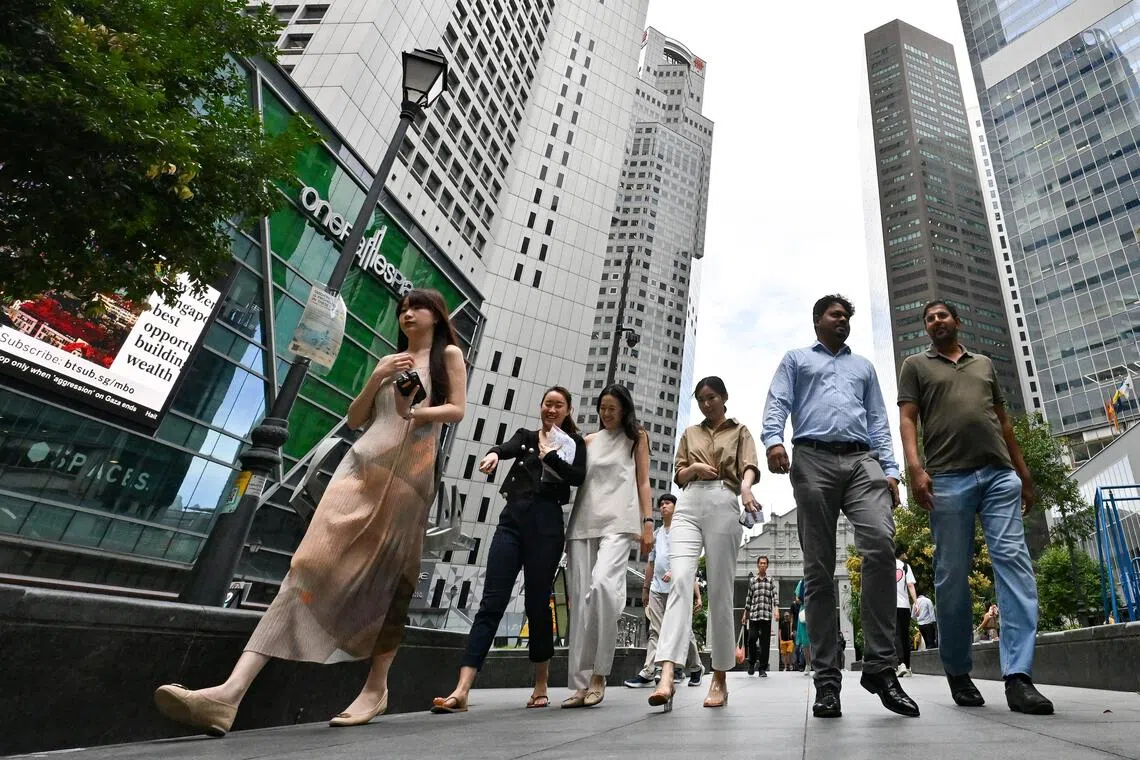Singapore tops global ranking for growing, attracting and retaining talent
Sign up now: Get ST's newsletters delivered to your inbox

Singapore led the category for generalist adaptive skills, supported by a workforce equipped with soft skills, digital literacy and an innovation mindset.
PHOTO: ST FILE
- Singapore tops the 2025 Global Talent Competitiveness Index, leading in generalist adaptive skills, surpassing Switzerland.
- The US fell from 3rd position in 2023 to 9th place, highlighting that no country is immune to talent erosion.
- Building resilience and adaptability among workforces is critical amid rapid technological disruption
AI generated
SINGAPORE– Singapore has claimed top spot in the Global Talent Competitiveness Index (GTCI) 2025
Singapore led the category for generalist adaptive skills, supported by a workforce equipped with soft skills, digital literacy and an innovation mindset. It also showed stronger retention capabilities, climbing seven places to 31st from 38th in 2023.
The index, which benchmarks how countries grow, attract and retain talent, is the only one accredited by the European Union.
It assesses 135 economies in 77 indicators across six pillars and is widely used by governments, companies and recruiters to shape talent strategies.
Launched in Singapore in 2013, the GTCI is published annually – except in 2024 when it was paused for the writers to redesign the methodology and framework – by business school INSEAD. For the first time this year, it partnered with the US-based Portulans Institute, a non-profit educational organisation.
Professor Felipe Monteiro, one of the report’s three authors and INSEAD’s senior affiliate professor of strategy, said Singapore’s workforce operates within one of the world’s strongest talent ecosystems – one that enables people to adapt, grow and thrive.
“It reflects a system that excels in education, skills development and lifelong learning… For the individual worker, this translates into better opportunities to upskill, greater career mobility and a higher level of protection against disruption, especially as AI reshapes jobs,” he said.
Top performers in the latest index are still largely wealthy economies and European countries, the authors noted, but places such as Israel, Qatar, Kenya and Tajikistan also stood out for generating strong talent outcomes relative to their inputs.
China, Asia’s largest economy, ranked 53rd, though this position should be read in the light of limited access to data from the country, Prof Monteiro said.
The US slipped from third place in 2023 to ninth in 2025, missing a spot in the top five for the first time since 2013.
Even so, the US scored strongly on preparedness for future disasters and household financial resilience, underscoring its continued institutional and economic resilience, Prof Monteiro said.
Its fall in the rankings is a reminder that the global talent landscape is becoming intensely competitive, and even longstanding leaders can lose ground if they fail to keep up with rapid shifts in skills, technology and workforce dynamics.
“No country, however strong, is immune to disruption in the race for talent,” he said.
Resilience and adaptability took centre stage at the launch of the index’s 264-page 11th edition at INSEAD’s Asia Campus in Singapore on Nov 26.
Co-author and chief executive of Portulans Institute Rafael Escalona Reynoso cited Singapore’s practice of seconding public servants to the private sector, as well as its use of SkillsFuture programmes to upskill and reskill workers, as key ingredients of its adaptability.
Making the opening address, Senior Parliamentary Secretary for Finance and Manpower Shawn Huang said human capital is one of the five areas of the economic strategy review, showing the inseparable link between talent strategy and economic strategy.
He said: “In Singapore’s labour-constrained economy, AI exposure could present more opportunities than risk.”
Professor Lily Fang, the university’s dean of research and innovation, said the world is already witnessing artificial intelligence’s (AI) displacement of white-collar jobs at an alarming rate.
It is not surprising that adaptive generalist skills emerged as one of the important skills to navigate the disruption, she said.
Assistant Professor Winnie Jiang, who specialises in organisational behaviour at Insead, said she chose to research resilience in two groups of people facing great disruptions: Syrians and journalists.
Speaking at a panel at the event, she said: “Across these two populations, I found the common thread: the core insight is that the resilience you have is not about being stoic.”
Hence, organisational leaders should not be mistaken about promoting a culture where nobody has anxiety or stress. Allowing workers to explore and reframe situations with colleagues builds resilience.
“It’s actually the opposite,” she said.
Asked how Singapore can balance opportunities for locals with specialised talents and skills that it needs to import, Prof Jiang, who grew up in China, studied in the US, and now lives in Singapore, said she believes most Singaporeans have a growth and open mindset.
“They are welcoming, they know international exposure is good. I think that sort of foundation is something that you need to keep, to basically keep Singapore as a bridging place... as a conduit of talents, if that makes sense.”



